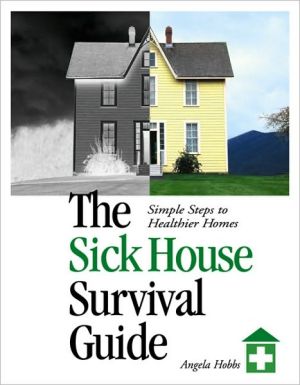

 |

|

The average rating for The Sick House Survival Guide: Simple Steps to Healthier Homes based on 2 reviews is 3 stars.
Review # 1 was written on 2008-05-25 00:00:00 Angela Riche Angela RicheFor those who have already encountered the writings of John Diamond, M.D. it should come as no surprise that he (unlike some who believe that culture comes to an end as soon as one departs our esteemed shores) does not hesitate to attribute the source of the word "holism" to someone who does not abide on the American continent'to the South African General J.C. Smuts, no less. His feeling of close affinity for the thinking of this great statesman in this respect shows his deep-set empathy for, and understanding of, those who are unafraid to explore their own psyches in relation to their immediate environs and beyond. After discussing the definition of holism, and asserting the relative newness of the term, Dr. Diamond reveals how its usage rapidly spread, indicating the global readiness at that point to accept a new way of thinking and the willingness to respond to environmental imperatives. (We can only hope that it is with such a spirit that we have embarked upon the twenty-first century.) Dr. Diamond then identifies Bertrand Russell's understanding of the term as a form of "holistic medical conception," but finds Russell's appreciation of the concept to be too limiting, in that he was a philosopher only of the mind. In contrast, he finds John Dewey's concerns with building up a total picture of a person in his entire environment to be more acceptable and in tune with his own thinking. Dr. Diamond advocates seeing every aspect of the sufferer (i.e. Everyman) as a whole. It is only once the sufferer has come to realize "that wholeness is the wholeness of Existence, [that] they are at last at peace. They have gratefully accepted themselves in their existence." Dr. Diamond expresses his belief that the ultimate questions of philosophy are: "What am I in Existence? And Where? And Why?" The author finds that to know this, and to teach it, is the only way to overcome the sufferer's anguish. As with his other works, Holism and Beyond: The Essence of Holistic Medicine is accessible and logical, with Dr. Diamond relating all that he has to say to the average person. His writing flows as smoothly as finely-spun silk and is as reassuring as a mother's loving touch. He focuses on his central arguments and never becomes distracted from the key issues. Dr. Diamond approaches the reader directly, adopting a personal and intimate tone that is likely to leave you hankering for more. With his writings being those of a highly skilled and exceptionally well-qualified holistic healer, they are worthy of the deepest consideration, and should most definitely not be overlooked. To gain additional insight into Dr Diamond's works, of which there are many, why not visit his official website at ? Doing so really should be a rewarding experience. |
Review # 2 was written on 2016-07-16 00:00:00 Steve locke Locke Steve locke LockeFor those who have already encountered the writings of John Diamond, M.D. it should come as no surprise that he (unlike some who believe that culture comes to an end as soon as one departs our esteemed shores) does not hesitate to attribute the source of the word "holism" to someone who does not abide on the American continent'to the South African General J.C. Smuts, no less. His feeling of close affinity for the thinking of this great statesman in this respect shows his deep-set empathy for, and understanding of, those who are unafraid to explore their own psyches in relation to their immediate environs and beyond. After discussing the definition of holism, and asserting that, though the term is relatively new, Diamond reveals how its usage rapidly spread, indicating the global readiness at that point to accept a new way of thinking and the willingness to respond to environmental imperatives. (We can only hope that it is with such a spirit that we have embarked upon the twenty-first century.) Diamond then identifies Bertrand Russell's understanding of the term as a form of "holistic medical conception", but finds Russell's appreciation of the concept to be too limiting, in that he was a philosopher only of the mind. In contrast, he finds John Dewey's concerns with building up a total picture of a person in his entire environment to be more acceptable and in tune with his own thinking. Diamond advocates seeing every aspect of the sufferer (i.e. Everyman) as a whole. It is only once the sufferer has come to realize "that wholeness is the wholeness of Existence, [that] they are at last at peace. They have gratefully accepted themselves in their existence." Diamond expresses his belief that the ultimate questions of philosophy are: "What am I in Existence? And Where? And Why?" The author finds that to know this and to teach it is the only way to overcome the sufferer's anguish. As with his other works, Holism and Beyond: The Essence of Holistic Medicine is accessible and logical, with Diamond relating all that he has to say to the average person. His writing flows as smoothly as finely-spun silk and is as reassuring as a mother's loving touch. He focuses on his central arguments and never becomes distracted from the key issues. Diamond approaches the reader directly, adopting a personal and intimate tone that is likely to leave you hankering for more. With his writings being those of a highly skilled and exceptionally well-qualified holistic healer, they are worthy of the deepest consideration, and should most definitely not be overlooked. |
CAN'T FIND WHAT YOU'RE LOOKING FOR? CLICK HERE!!!